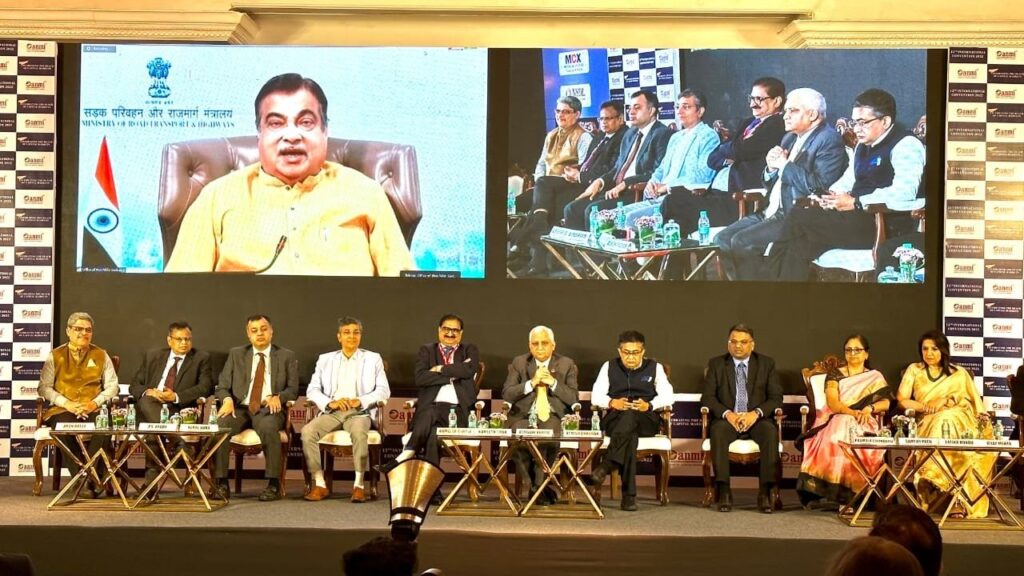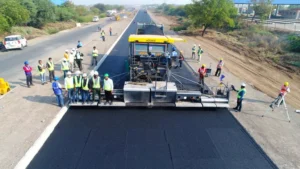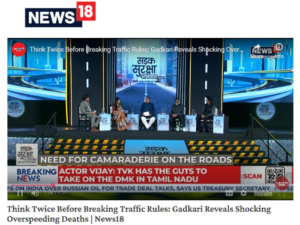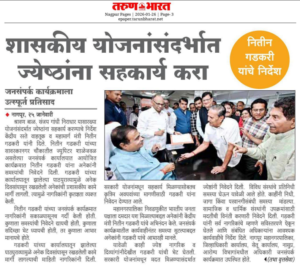“The financial markets need to come up with innovative models to fund India’s Infrastructure growth. We are inviting investments in the PPP model.”
Union Road Transport and Highways Minister virtually addresses at the 12th International Convention of Association Of the National Exchanges Members Of India
Green express highway between Mumbai and Bangalore to reduce journey time to 5 hours
The Ministry of Road Transports and Highways is planning to take over the State Highways with high traffic density from the State Governments for a period of 25 years. Therafter, those state highways will be converted into 4 or 6 lane highways and then the Centre will collect toll from those highways. This was stated by Union Road Transport and Highways Minister Nitin Gadkari in a virtual address at Association Of National Exchanges Members Of India (ANMI)’s 12th International Convention which was held in Mumbai today. After a period of 12-13 years, the investments will be fully recovered from those state highways along with intersts and land acquisition costs, further added Shri Gadkari. He urged that investments in the infrastructure sector of the country will be risk-free and yield good returns and called for cooperation in the investment for infrastructure. “The financial markets need to come up with innovative models to fund India’s Infrastructure growth. We are inviting investments in the PPP model. We can export energy to the world if we channel our investments to waste management, green hydrogen, solar, and several such projects. Innovation, Entrepreneurship, Science, and Technology is the wealth of future India.” The Centre has given the highest priority to development of infrastructure in the country, he added.
Speaking about infrastructure development, he informed, “We are planning a green express highway between Mumbai and Bangalore”. It will be a 5 hrs journey between Mumbai-Bangalore and 3.5 to 4 hrs between Pune and Bangalore, he added. The Mumbai-Pune Express Highway will take a turn from near the Ring Road of Pune and start as the Highway towards Bangalore, he further mentioned.
Likewise, 27 green express highways are coming up in the country. By end of this year, there will be highways connecting Delhi – Dehradun in 2 hrs, Delhi-Hardwar in 2 hrs, Delhi -Jaipur in 2 hrs, Delhi – Chandigarh in 2.5 hrs, Delhi – Amritsar in 4 hrs, Delhi – Srinagar in 8 hrs, Delhi – Katra in 6 hrs, Delhi – Mumbai in 10 hrs, Chennai-Bangalore in 2 hrs and Lucknow- Kanpur in half an hour, stated the Union Road Transport and Highways Minister. Highway projects connecting Gorakhpur to Siliguri and Varanasi to Kolkata are also on the cards. “Just like the National Water Grid, we want to develop a National Highway Grid”, he said. He also stated that income from tolls have come to Rs 40 thousand crore at present and it will rise to Rs 1 lakh 40 thousand crores by the end of 2024..
The Ministry is also in the process of constructing 75 tunnels at a cost of Rs 2,50,000 crores, stated the Minister. On an average, 40 kms of roads are constructed per day in the country, informed Shri Gadkari. He further stated that, presently there exists 65 lakh Km of road length in the country and out of it, 1.45 lakh Km are of National Highways. In the future, before making highways, the plan is to acquire land in cooperation and JVs with private sector investors, stated the Union Road Transport and Highways Minister.
Shri Gadkari further said that there is a huge potential for development of public transport in the country. There is good economic viability in introducing e-buses, he said. Some of the projects taken up by his ministry include starting electric vehicles, trolleybuses and bus-ports in cities. Also, AC Luxury buses may be started for tourists, he added. Under the Parvatmala scheme, ropeways, cable-cars and funicular rail are being developed in hilly areas. The restaurants and parking plazas that will come up surrounding these projects will also add to the sources of revenue, said the Minister.
The Road Transport and Highways Ministry is also looking at diversifying fuel base to include ethanol, methanol, bio-diesel, bio-LNG, BIO-CNG, electric and green hydrogen. Under the National Hydrogen Mission, the Centre wants to make India a green hydrogen hub and export this form of energy to the world, stated the Minister. He further said that there is economic viability in making ethanol from sugar-cane, bamboo and other agricultural products. “By making bio-fuels, we may increase India’s GDP in agriculture”, he said. Bio-fuels are import-substitute, cost-effective, pollution-free and indigenous, he added.
Stating that the country’s automobile industry’s size is Rs 7.5 lakh crores, Shri Gadkari said that there is a plan to make it a Rs 15 lakh crore industry within 5 years. Automobiles industry has maximum employment potential and brings in maximum GST to the Centre and states, he added. The Minster also said that investments in areas of solid waste management and liquid waste management are going to yield good returns.

Maharashtra Deputy CM Devendra Fadnavis said, “I am sure that lots of brilliant ideas will be generated for the development and growth of financial markets in India. I am delighted that the theme of our conference is based on Amrit Kaal which is also the vision of our honorable prime minister Shri Narendra Modi.”
The dignitaries present on the occasion included Whole Time Director of SEBI Ashwini Bhatia. During the convention, Mr. Kamlesh Shah, President of, ANMI announced a major Cybersecurity initiative. “Association of National Exchanges Members of India (ANMI) has been assigned the important task of onboarding members for the SEBI committee on cybersecurity which has been formed in alliance with stock exchanges. The committee is mandated to create an appropriate framework for cyber security for all financial intermediaries.”
About ANMI:
Association of National Exchanges Members of India (ANMI) is an association comprising around 900 Stock Brokers from across the country who are members of National Stock Exchange of India Limited, The Bombay Stock Exchange, Multi Commodity Exchange and other exchanges having national presence. The basic objective of ANMI is to work for the growth of the capital markets thus contributing to the economic development of the country and the overall interest of investors and its members at large by becoming a medium between regulator, exchanges and participants.




